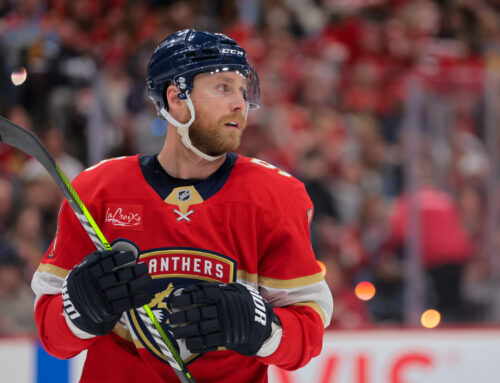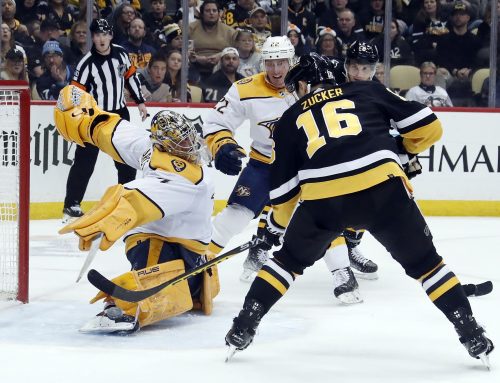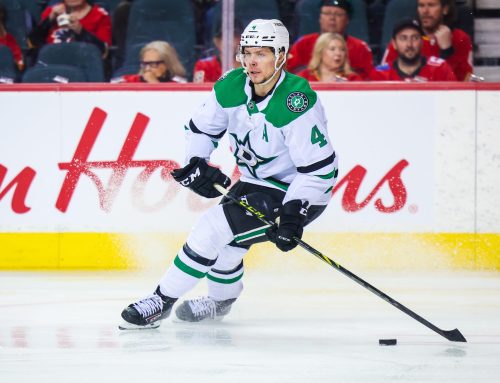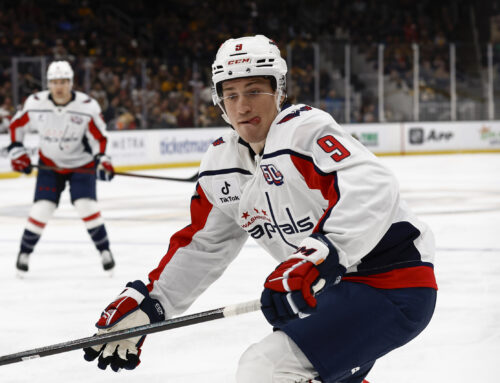
This week's Capped continues our series looking into how to project player salaries by focusing on bridge deals and extensions.
****
The toughest part of projecting salaries is not the big free agents, we know that they are going to get paid (and in fact they are usually overpaid). The hardest contracts to project are the first ones after the entry level deal, before a player has really proven themselves. The discrepancy stems from the player and the team having very different ideas of where the player’s career may go, with both wanting to cover themselves from the worst. This is where the bridge contracts usually come in.
Bridge contracts are a nice compromise for both the player and the team, allowing for more certainty with a future contract. Players avoid getting locked in for less than they are worth, and teams avoid possibly carrying an anchor contract on their books down the line. When it comes to the actual negotiations, everyone is a little different. Looking at two examples of star players, we have P.K. Subban and Mark Scheifele. On one hand, you have Subban situation, where his contract ideas differed greatly from those of the Canadiens management, leading to a short bridge contract ($2.875 million each year for two seasons), where he won a Norris trophy as the league’s top defenceman. His next contract which he signed in 2014 was highest for a defenceman at that time, deservingly so. To this day Subban remains the top defenceman in the league when ranked by cap hit.
Mark Scheifele took a different route. After a successful third year in the NHL, where the Jets centre topped the 60-point plateau for the first time, Scheifele decided to cash in then and there, inking a long-term deal, of $49 million over the eight years. Over the next season and a half, Scheifele has massively outperformed that contract, and may currently be on the most team-friendly contract.
To give you a leg-up come July 2018, here are some model projections for bridge-contract candidates for this year.
****
Sam Reinhart (C/RW) – Buffalo Sabres
Projected Cap Hit: $2,576,103
Projected Number of Years: Two
Sam Reinhart is falling well short of expectations in a contract year. The third year forward has struggled to find a niche on a team that really doesn’t have many top end forwards. His ice time is down to 15:48 minutes per game, lower even than his rookie campaign. The underlying percentages are a little lower than in previous seasons, but not exceptionally out of line. What kind of player do we see in the future?
The 22-year-old former second overall pick is a perfect example of a player in line for a shorter “prove it” contract. The two-year, $2.6 million per season contract predicted by the model is not too far off the two-year $1.95 million deal signed by Sam Bennett last offseason. Bennett was drafted two slots later than Reinhart, and has gone through some similar struggles. Both have bounced up and down the lineup, shifting to wing recently after they had trouble bearing the responsibility of the centre position. Bennett has looked a little more comfortable since the shift, and Buffalo hopes the same can be said for Reinhart.
A bridge deal makes sense for both Buffalo and Reinhart here, as there is a wide variance in perception of the player, his talent level, and how much more he can grow. Buffalo is rebuilding, and can’t afford to lose young players, yet they also don’t want to get stuck overpaying them. Should Reinhart bust out over the next two years, they would be more than happy to pay him long term. Unfortunately, Reinhart is not passing the eye test at the moment. A price tag of $2.6 million seems about right, and if it’s any higher, I would stay away, regardless of the number of years.
****
Kevin Hayes (C/RW) – New York Rangers
Projected Cap Hit: $4,609,062
Projected Number of Years: Five
Kevin Hayes is coming off almost exactly the contract predicted for Reinhart (Two years x $2.6 million). He seems to fluctuate every second year being above 40 points, with the other years seeing his production dip into the 35-point range. After some middle of the road production from Hayes, and with spots opening up in the Rangers’ top nine forward group, he can’t be signing another bridge deal, can he? Hayes is going to be one of those players that likely takes a little less on a contract with some term, but shortens the deal a little to take greater advantage of his UFA years. The model has him at $4.6 million for each of the next five years, however it would make more sense for him to take that money on a three or four-year deal, and get both the security, and another chance at hitting pay-dirt in free agency.
With the ice time opening up due to Rick Nash and Michael Grabner likely moving on, Hayes stands to continue his up-and-down trend with another up, seeking his first 50-point season. His shot rate leaves something to be desired, and based on the stats counted in your individual league, Hayes’ value fluctuates. Anything above $4.5 million though and you need to be thinking long and hard about how much value the Rangers’ winger is really bringing to your roster.
****
Phillip Danault (C/LW) – Montreal Canadiens
Projected Cap Hit: $5,096,109
Projected Number of Years: Eight
While Montreal continues to look for a first line centre, Danault is filling the role by default. As a result, he is putting up decent numbers, that have landed him into the range to be predicted for a max length contract. After Montreal ended up having to pay the big bucks to P.K. Subban following his bridge deal, it seemed that they tried two different strategies with Alex Galchenyk and Brendan Gallagher. Galchenyuk received an extra year on his bridge deal, and as a result made a little bit more per year than he otherwise might have. Gallagher on the other hand got a bit of a pay-cut, but in turn received six years of security following a 47-point season (he has yet to eclipse that mark due to injuries).
Montreal would likely be best served by following closer to the Gallagher route, giving him a longer deal at a price that makes sense for both sides, now and down the line. $5 million may seem a high for Danault, but he reminds me of Tyler Bozak a few years ago. Centering the top line with a few skilled wingers, Bozak was worth a $4.2 million cap hit over six years. Inflate that a little due to the rising cap limit, add an extra year to keep the cap hit down, and you end up pretty close to a $5 million cap hit on a seven-year deal. Danault also still has the upside to develop and play himself into, and perhaps above that type of contract. Time will tell if Montreal feels the same way. If a centre such as John Tavares or Paul Stastny are brought in, then Danault gets knocked down a peg, both for the contract, and his expected production.
****
That caps off another Thursday. Let me know in the comments if there is something else you would like me to cover next week along the lines of projecting player salaries.
As always, you can find me on twitter @alexdmaclean where I post some of my other smaller musings that don’t make it into the articles.






 VAN
VAN L.A
L.A CBJ
CBJ NYI
NYI PHI
PHI ANA
ANA CHI
CHI
